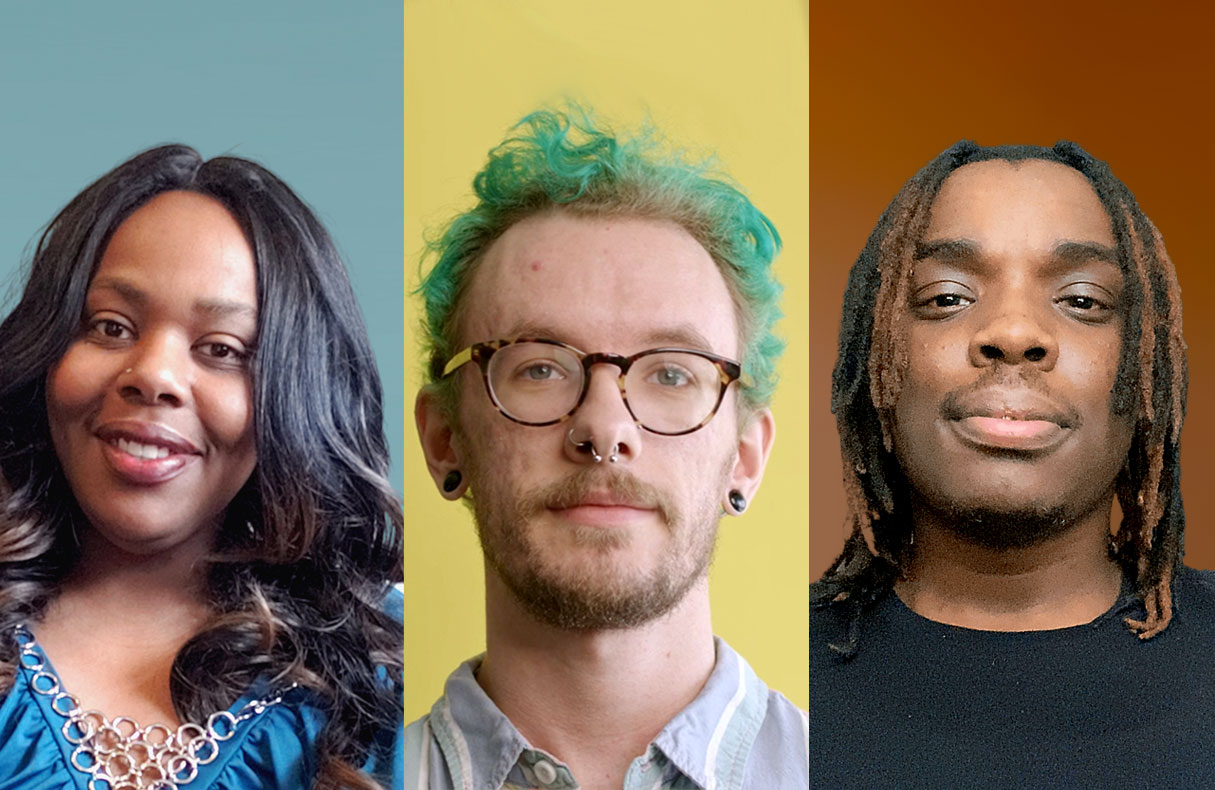Catalyte public sector apprentices bring a flexible, agile mindset to every client engagement. Couple that with our rigorous, customizable technical development and clients quickly trust the work that apprentices deliver.
I have the privilege of working closely with a team of our apprentice software developers, business analysts, UX/UI designers and more as they’ve built an essential health care platform for a public sector client. The work they’ve done to date has had an incredible impact on their local community, driving improved outcomes and accessibility. The apprenticeship has also created a career path for them, allowing them to love their work and receive well-deserved recognition for it.
I caught up with three of these public sector apprentices to discuss their first year on the project, what they’ve learned and how they’ve grown during that time.
The following transcript has been edited for length and clarity.
Kate Burgin: I’m Kate Burgin, general manager of Talent Stream. I’m joined today by three amazing Catalyte public sector apprentices, all of whom work on a health care project. Please introduce yourselves.
Tyler: I’m Tyler and I’m an API developer. Before Catalyte I worked in food service.
Marvin: I’m Marvin and I’m also an API developer. Before Catalyte, I worked as a medical courier.
Lauren: Hi, I’m Lauren. I’m currently a business analyst. Prior to that, I was in tech sales and had a career in customer service and tech support.
Kate: Thank you. You all have worked on this public sector client for over a year now. Where have you grown the most during that time?
Tyler: Catalyte trained us to be full-stack developers. That means we could take on work from the entry point on the frontend – what the user is interacting with – all the way to the back end, not just the API level, but the database level. And we were placed on a team where we’re responsible for the component directly in the middle of the user interaction and the stored data. We’ve learned how to communicate with an entire team – frontend, backend, QA teams…so many teams to talk to.
Kate: Marvin, you’ve talked about loving to have “value” in your work. What do you think the value in your work has been with this public sector client?
Marvin: The work that we do on this client is especially valuable because it has a great impact. It’s making health care more available to the wider populace, which I think is an amazing thing. It’s great to work on something that will be good for the world, that matters and that I’m passionate about…as cheesy as that sounds.
Kate: Passion and impact are never cheesy, Marvin. Thank you for sharing that. Lauren, you’re in a junior BA role, but in reality, you’re one of the most tenured people on the team. How do you approach that interesting balance?
Lauren: It’s definitely an interesting balance. People bring different perspectives to the project. So while some people won’t be as experienced in this project, they bring a new value that I try to learn from. I end up answering questions for new people, so it’s a give-and-take relationship.
Kate: How would you describe the value that you and your fellow apprentices bring to your work that others might not?
Marvin: The value that we bring as Catalytes is our upstanding professionalism and our unshakable character. We bring a technical level of quality that you can rely on and trust. We’re drivers and push for quality.
Tyler: We’ve very strong communications and we’re reliable developers, BAs, designers…everything. If a team is looking for a senior developer but struggling to find one, you can rely on a junior Catalyte developer to do the job just as well, if not better, in the same amount of time. You can rely on their consistency. Their confidence. Their flexibility.
Lauren: We bring a certain freshness. We are experienced enough to know what we know. But new enough to be resilient and still learn. It’s a good mix of being sponges but also shake things up a bit, too.
Kate: How did the development portion of the Catalyte apprenticeship prepare you for the work you’re doing now?
Tyler: I could never have imagined how well Catalyte could prepare us for this client. The client really trusts Catalyte public sector apprentices. We see our work recognized as being super clean code that people want to adopt as project standards. That’s just what Catalyte taught us to do. I think we’re going to build something really cool and clean.
Kate: What other feedback have you gotten from your managers?
Tyler: My team has asked me to participate in a new developer interview panel!
Kate: That’s a huge compliment! Marvin or Lauren, what feedback have you received so far?
Lauren: I’ve received tons of compliments from my supervisors about my initiative, going above and beyond expectations to ensure our requirements are satisfied.
Marvin: I’ve received feedback like, “Thank you for getting this API deployed in two days for us so we can give access.” That’s amazing to me because I wasn’t a developer just two years ago. It’s amazing that I’ve progressed this far.
Kate: So Marvin, what’s the response when people find out that you’re delivering this value but you don’t have a computer science degree and you went through an apprenticeship program?
Marvin: Surprisingly, it’s never come up. I think that speaks to just how good our training is. I think my manager would be surprised to find out that I didn’t go through “the normal channels.” I’m just part of the new generation of software developers who have come into IT “unconventionally,” but who still can do their job very well.
Kate: Finally, when you think back over the past year, how have your lives changed? How do you feel now from when you first joined Catalyte?
Marvin: I was looking for a career more than a job. That lit a fire under me. I was able to get hired and change my life. It’s been amazing so far.
Lauren: The biggest change for me is that I don’t hate Mondays anymore. I really enjoy what I do.
Tyler: I feel like I have a path now and I’m being recognized for my work. I know this is the career I want. Opportunities are opening up. Team leads are constantly letting us know, “Hey, you’re doing a great job. You’re bringing a lot to the table.”
This post is adapted from a Sourcing for Innovation podcast. You can watch a preview of and listen to the whole conversation below.


